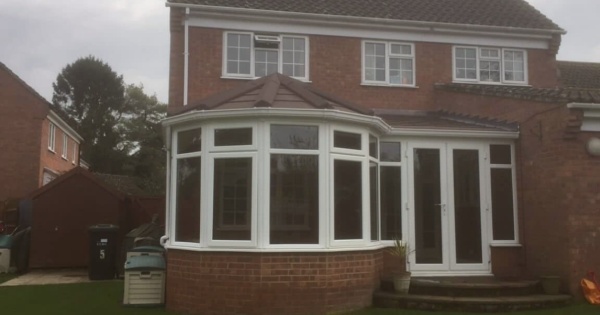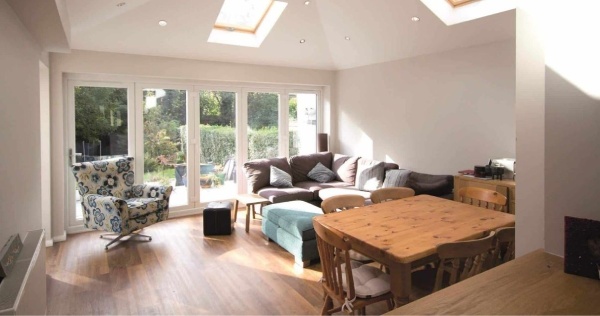You’ve calculated the costs, done your research and considered all the options. You’re very excited about converting your conservatory roof – you’ve even started to picture your family gathered around in your new cosy garden room, just the right temperature all year round...
Then the thought hits you:
How much admin is this all going to take?
Will there be loads of paperwork to ensure we’re complying with building regulations?
Do we have to fill in reams of complicated forms for the council and the planning authority?
The prospect of notifying all the right people might still be holding you back from giving the green light to your dream conservatory roof.
Luckily, we’re here to set your mind at ease. In this article, you’ll discover exactly who you should tell about your roof conversion (officially and informally), and how simple and painless the process can be.
Building Regulations and Planning Permission
If you’ve ever had contractors come and do any major work to your home, you’ll probably be familiar with the minefield of legislation, building regulations, administrative box-ticking and so on that often needs to take place.
Therefore it’s no surprise that one of the most common concerns we hear relates to informing local authorities.
Do we need to submit paperwork?
What building regulations do we have to comply with for a conservatory roof conversion?
Are there different regulations for a solid conservatory roof compared to a glass roof?
Building regulations and planning permission exist to ensure that buildings within an area are safe and conform to uniform standards. Without them, anyone could do anything they liked to their homes, which could lead to some unsightly and potentially dangerous houses being built.
The Planning Portal states that the ultimate responsibility for complying with relevant rules and building regulations belongs to the property owner. Failure to comply may result in demolition and/or restoration – at the owner’s cost.
Thankfully, when it comes to conservatories and roof replacements in England and Wales, a lot of the rigmarole of full planning permission is not required.
The original building of the conservatory, orangery or sunroom itself comes under the same planning rules as any other property extension, with standardised limits on length, width, position and height of single-storey conservatories.
Converting a conservatory roof only consists of replacing the existing roof – leaving the existing walls intact.
Most of the room’s dimensions aren’t going to change at all. So all the homeowner usually needs to submit is a Building Regulations Notice. Our advice (to be on the safe side) is to use a trustworthy and experienced roofing specialist who is familiar with your local authority’s regulations.
They’ll be able to advise you on exactly what notifications you need to give based on your specific project – if you’re especially lucky they’ll even inform the authorities for you.

Informing Tenants About A Conservatory Roof Conversion
If you rent out your house, or part of your house, one group who will obviously be affected by a conservatory roof conversion is your tenants.
The building work itself may disrupt tenants’ access to parts of the property as well as cause potential noise, mess or obstructions from the work taking place. It’s important to let them know to expect this, even for a short period, especially if they’re working from home or often in the property during the day.
However, there are also legal requirements regarding tenants when carrying out building works.
One element often written into a tenancy agreement or applied by implication, is known as a “quiet enjoyment” clause. This is a generally non-controversial notion that since a tenant is paying to live in and enjoy the property, they should be allowed to do so without undue noise or disruption.
There are also legal limits on noise levels in accommodation. Excessive noise is considered a hazard which could result in Council Environmental Health Officers becoming involved.
Nonetheless, landlords’ responsibilities when planning building works are fairly straightforward. Here are some tips we recommend:
- Inform tenants ahead of time – give tenants plenty of notice of the conservatory replacement work (ideally in writing) so they’re not taken by surprise
- Discuss and agree on the details – it’s your property but it’s their home too. There may be a particular period in their schedule where disruption and noise of the build will be less impactful. Do your best to accommodate their needs and find a solution that works for everybody
- Compensation – the last thing anyone wants is to end up in legal wrangling with their tenants. If the conservatory roof conversion is going to be significantly disruptive to their enjoyment of the property, consider offering a temporary reduction in rent during the construction period
- Minimise the disruption wherever possible – find a roofing company that can do the job tidily, professionally and quickly. The last thing you or your tenants want is unforeseen complications that increase the building time or require them to come back and fix things later on. Make sure the builders know which parts of the house they can use, plan their entrances and exits, and don’t cause obstructions. This is where a good personal relationship with a trusted contractor goes a long way
A good rule of thumb is to ask yourself what you would want to know if the situation were reversed. If you imagine you’re the tenant in someone else’s property, what would you expect and appreciate if work were to be carried out?
Lastly, if you intend to continue renting to your tenants after the conservatory roof conversion, remind them that they’re going to directly benefit from the work. A new roofing solution that keeps the room cool in summer and warm in winter will be a light, welcoming space for everyone who uses it.

Notifying Your Neighbours
Noise from next door is a pain, as anyone can tell you who’s lived near a property with construction going on.
While you’ve got no legal obligations towards your neighbours beyond maintaining safe noise levels, it’s always courteous to inform the closest local inhabitants.
This has several advantages.
Firstly, if you have yet to sign off on a particular roofing solution, a chat over the garden fence may yield some good local recommendations.
The best construction and roofing renovation companies often benefit significantly from word of mouth – so if you know somebody nearby had their conservatory roof replaced, why not ask to see it and hear about their experiences before you sign on the dotted line?
The other side of that coin is referral benefits. For example, Projects4Roofing offer £100 of John Lewis vouchers to anyone who refers a friend or neighbour to have their conservatory roof converted too.
Following a quick neighbourly chat, you may find that the Joneses at number 41 have been thinking of converting their conservatory too. If you’ve had a good experience with your contractors you may find yourself with a delightful reward for passing on the recommendation.
Lastly, it’s not always possible to be best friends with everyone on the street, so a heads-up about a little disruption can mitigate the worst outcomes between neighbours. Give them plenty of forewarning, and go armed with assurances from your proposed roof conversion specialist.
Find out about the length and scale of the work, as well as their proposed working hours, and plans to minimise mess, noise and deliveries. Put your neighbours’ minds at ease and you’ll keep the peace.
To soften the blow further, our Guardian Roof replacement system is installed in just 2-5 days, with very little on-site building and minimal disruption.
Tell Your Friends and Family
Finally, make sure to notify your loved ones. After all, your new warm conservatory is going to need friends and family to fill it once the solid roof is installed! Share your excitement and arrange a (socially distanced) gathering for when the work is finished.
In addition, it’s another opportunity to show off a beautifully renovated part of your home. Plus that means more local people to recommend for the referral scheme – which will benefit you both if they also choose Projects4Roofing.
Conclusion
If in doubt it’s always best to keep everyone informed when you’re planning a conservatory roof conversion.
At Projects4Roofing we pride ourselves on our honesty and openness, and we encourage our customers to do the same. When you speak to our team you’ll get a clear fixed quote on your solid roof solution.
And because we manage the whole process from start to finish we’re able to give an exact idea of what, when and how long the project will take.
We’ll also take care of all official building regulation paperwork for you, so you don’t need to worry about notifying the council or planning authority.
The Guardian Roof system that we use is the only solid conservatory roof solution that is LABC certified, meaning the regulations process is fast-tracked, giving you peace of mind and saving time.

If you’re at the point of arranging a conservatory roof conversion in the East Anglia region be sure to reach out to us. One of our roofing specialists will give you honest, personalised advice on your garden room roofing solution.
And because we’re the leading solid conservatory roof company in Cambridgeshire Suffolk, Norfolk, Essex and Hertfordshire, we’ve probably converted a conservatory roof near you. So speak to your friends, family and neighbours, or ask us if you want to see a real-life example of our work.
Get in touch today on 01638 507730 or info@projects4roofing.co.uk, or head to our website to request a quote.



